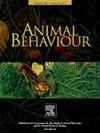Foraging location preferences reflect memory interference associated with spatial learning tasks in a food-caching bird
IF 2.3
2区 生物学
Q2 BEHAVIORAL SCIENCES
引用次数: 0
Abstract
Strong memories interfere with learning new information through proactive interference, potentially contributing to a trade-off between retaining older memories and acquiring newer ones. Due to mixed evidence for such a trade-off, it is unclear to what extent proactive interference may impact fitness-related behaviours in wild populations. Here, we explored the effects of proactive interference on memory retention and acquisition in wild mountain chickadees, Poecile gambeli, by assessing foraging behaviour at feeder arrays after birds had completed a spatial learning and memory task and a subsequent reversal learning task and when all feeders provided food. Overall, post-testing foraging behaviour was consistent with predictions of proactive interference. Chickadees that learned the location of a food reward better in the first spatial learning and memory task later foraged more from the first task's rewarding location and less from the reversal task's rewarding location, compared to birds that performed worse. In contrast, chickadees that learned the new information better in the reversal learning task later foraged more from the reversal task's rewarding location and less from the initial memory task's rewarding location. These results suggest that interference from strong memories had a lasting effect on foraging preferences.
求助全文
约1分钟内获得全文
求助全文
来源期刊

Animal Behaviour
生物-动物学
CiteScore
4.60
自引率
8.00%
发文量
236
审稿时长
10.2 weeks
期刊介绍:
Growing interest in behavioural biology and the international reputation of Animal Behaviour prompted an expansion to monthly publication in 1989. Animal Behaviour continues to be the journal of choice for biologists, ethologists, psychologists, physiologists, and veterinarians with an interest in the subject.
 求助内容:
求助内容: 应助结果提醒方式:
应助结果提醒方式:


